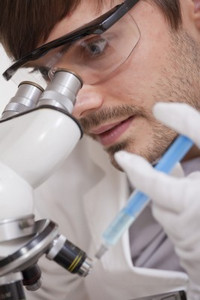Forensic Chemistry
Colleges, Jobs & Salary for Forensic Chemists
|
Get FREE Info From Schools |
A forensic chemist studies chemicals related to crime scenes. Learn about the best forensic chemistry colleges & salary ranges for forensic chemistry jobs
Just as the name might suggest, forensic chemists analyze chemical materials to aid a criminal investigation.
The forensic chemist hardly ever spends time in the field, collecting evidence at crime scenes. Instead, such materials are found by other specialists and brought to the chemist in the lab.
Any number of materials might be considered evidence for the forensic chemist to test and analyze, including:
- Blood stains
- Chips of paint
- Broken glass
- Clothing fibers
- Bullet fragments
Beyond such physical evidence, the forensic chemist is also charged with the responsibility of forensic toxicology. This comes down to searching for and analyzing drugs and poisons—in the form of powders, liquids, pills, etc.—that may be found on evidence or at a crime scene.
Like other criminal justice careers, this is a profession that works to aid the law system in putting away the bad guys and providing the victims with a sense of justice. It may not be as glamorous or exciting as television and the movies make it out to be, but it’s certainly an incredibly important role.
Best Forensic Chemistry Colleges & Schools
Obviously, such a position as forensic chemist takes some real education and training. Not only does this professional need to be well versed in the science of chemistry, but also in the world of criminal justice. To straddle these two worlds efficiently and successfully, the forensic chemist candidate needs to go to school.
There are many different ways to earn your degree, but the easiest and most cost-effective is to attend an Internet-based college or university. By doing so, you’ll avoid the stress of relocating your life for four years and you’ll be able to keep your day job. It’s truly a win-win situation.
Forensic Chemistry Jobs
 |
Within the field of forensic toxicology & chemistry there are various positions you have the opportunity to fill. While you could simply be a general forensic chemist, you can also pursue a specialty career.
Some of these focuses include:
- Fingerprint analysis
- DNA analysis
- Drug and Alcohol analysis
- Blood analysis
Like with most facets of forensic science careers, you can also get a managerial forensic chemistry job. You can be in charge of other technicians or chemists in a department, running the bureaucratic affairs of your staff.
This may not seem incredibly appealing on the surface, but with a higher salary, this is a destination for many forensic chemists nearing retirement.
Average Salary for Forensic Chemist
The salary range for forensic chemists is quite large. This is because different regions have different costs of living that affect the salaries of employees who live there.
So, you could make a pretty decent living in New England, but it may not be anything near what you could make in Hawaii. It’s all about how that region pays their employees.
On average, though, you can expect to make $35,000-$45,000 when you first start off. But with enough experience or expertise, that number can rise nearly to six digits.
You won’t get rich working as a forensics chemist, but you can definitely make a comfortable living and support your family.
|
Get FREE Info From Schools |
Return from Forensic Chemistry to Forensic Careers
Return from Forensic Careers to Criminology Degree





